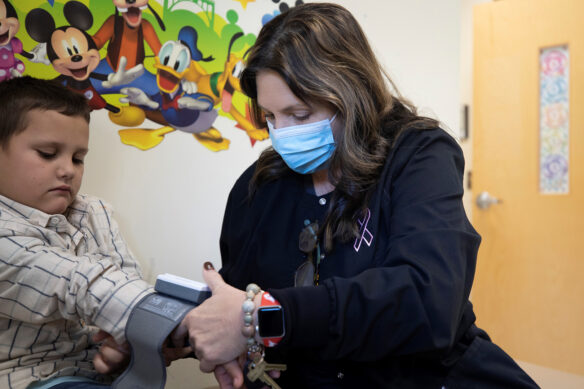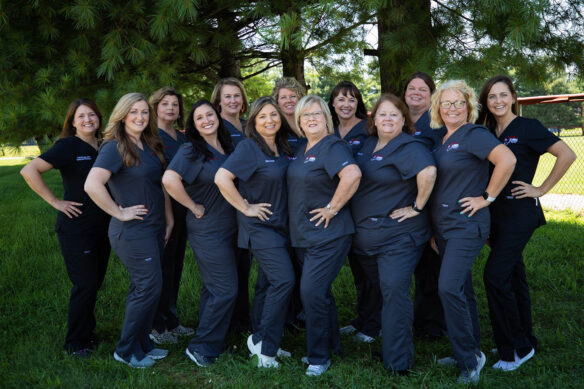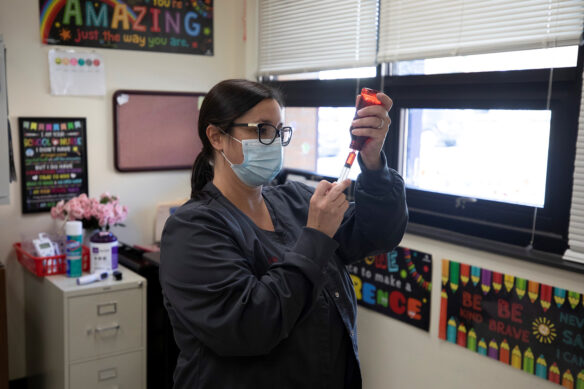
Christie Paris Minor, RN, takes a student’s vitals at Foster Heights Elementary’s (Nelson County) Care Clinic. The district employs 11 full-time Registered Nurses and two Advanced Practice Registered Nurses as part of Nelson County Board of Education’s investment in the health and well-being of its students. Photo by Forrest Berkshire Oct. 20, 2022.
Editor’s Note: This is the first story in a series on Kentucky Teacher about educational support staff.
Every day of the past 18 years has looked different for Laura Rhodes. One minute she might be helping a student who fell at the playground. In the next minute, she might be helping a student with their insulin pump. Yet every day for the past 18 years, Rhodes has gone to a job she loves- being a school nurse.
“Before I started here, I never really had a clue,” she said. “School is the stable place to come and sometimes students do not even realize the chaos in their lives and it comes out in other ways. It could be ‘My head hurts’ but turns out the student didn’t sleep because ‘My mom was out late, and I was worried.’ You learn what is going on with them so we can help them in other ways.”
Rhodes, currently at Apollo High School (Daviess County), is one of nine district nurses. Kentucky public schools reported 1,317 school nurses statewide for the 2021-2022 school year. School nurses are often on the frontline of learning about the problems students may be facing at home and helping them get needed care ranging from medical attention to mental health essentials to food insecurity.
At other times, circumstances can quickly arise where school nurses must navigate the situation to ensure the health and well-being of the student.
“We’ve had several kids who never had a seizure in their lives and then they have one at school for the first time,” Rhodes said. “I make sure our staff members know what to do if it happens like laying them on their side, noting the time.”
A mile down the road from Rhodes is school nurse Michelle Jones, who has been at Burns Middle School (Daviess County) for five years. Before she became a school nurse, Jones had worked as a an allergy and asthma physician and in emergency rooms.
“A lot of that training prepared me for here because you never know what each day will bring,” she said. “It can change every minute, depending on what takes place in the school, whether it’s an accident or injury or several sick students … you never know what’s going to happen.”
During the summer, school nurses are busy preparing for the year ahead. They check up on current health guidelines published that summer or during the year and look through patient health information when a parent and student complete registration.
As the school year approaches, school nurses begin contacting parents of students with chronic issues to develop care plans to accommodate any special health care needs. This requires collaboration between families, primary care providers, educators and administrators.
“There’s a lot of things in school health most people don’t know,” Jones said. “Most people think we give Sprite and crackers and a cough drop all day long. There is a lot of case management and helping families access resources. Our main goal as school nurses is to keep students healthy and in the classroom.”

Nelson County Schools’ Care Clinics have 12 full-time registered nurses (RNs) and two full-time advanced practice registered nurses (APRNs) that provide free onsite and virtual services. Photo by Forrest Berkshire.
Nelson County Care Clinics
In Nelson County Schools, student health is a priority for the district, which made a serious financial and logistical commitment by fully funding a Care Clinic. The clinic has 11 full-time registered nurses (RNs) and two full-time advanced practice registered nurses (APRNs) that provide free onsite and virtual services.
“Schools provide breakfast and lunch because it’s hard to learn on an empty stomach. We provide health services because children who are sick or not feeling well are not in a good place to learn,” said Felicia Flanagan, director of nursing services for Nelson County Schools. “Our district is committed to providing free on-site health services to our students because we realize that student health directly impacts their ability to learn and their overall well-being.”
Flanagan said the services provided at the schools may be the only healthcare access available for a student.
“Sometimes students show up sick because the parent doesn’t have an option or choices,” she said. “Offering health services to students who may not have access during their childhood can potentially impact the trajectory of their future health and well-being as an adult.”
In the 2021-2022 school year, the Nelson County Schools Care Clinic had 23,000 RN visits and 2,000 nurse practitioner visits. A staff member, a parent or guardian or, a high school student themselves can make a referral, which is triaged according to the severity of the complaint. If needed, the RNs can refer to the APRN for an additional assessment.

Marley Cecil, RN, measures a dose of medicine before administering it to a student at Foster Heights Elementary’s Care Clinic. Photo by Forrest Berkshire, Oct. 20, 2022.
Nelson County also gives a unique opportunity to students who are seniors and have an interest in potentially pursuing a healthcare field as a part of their emphasis on work-based learning. Students can apply to work in the Care Clinical program up to 18 hours per week. They go through an application and interview just like any other job to secure the paid position.
The Care Clinical student is often the first one to greet patients, learn the reason for their visit, obtain medical history, take the vital signs, assist with diagnostic testing and assist the nurse in any way needed for that patients’ visit.
This year, Nelson County has seven students in a clinical program, all with a variety of healthcare interests ranging from doctor, nurse, dental hygienist and dietician. According to Flanagan, the students get to “understand the healthcare needs of our community and whether they are truly interested in pursuing this work.”
“It’s hands-on experience dealing with real health issues,” Flannagan said. “The students learn lifelong skills like organization, prioritization, communicating with others and most importantly, teaching the students how to show empathy.”
At the end of the day, no matter what the day brought, school nurses are one of the many support systems students have during their educational experience.
“We are advocates for our students,” Flanagan said. “We collaborate with teachers, with counselors, with parents to provide that holistic approach to that student’s educational experience.”




Leave A Comment